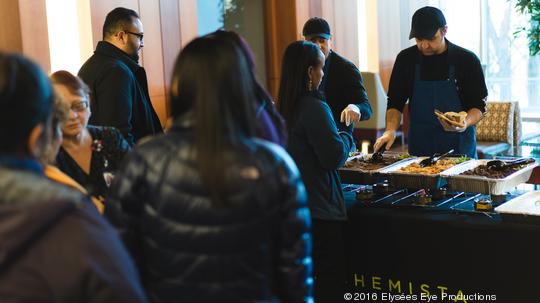
It all started with a classmate.
Christine Marcus was working toward her MBA at MIT, eating mostly for sustenance, not for taste. She and her classmates ordered in plenty—they didn't have much time to go to the cafeteria.
"While I was at MIT, I had no background in food—zero," Marcus said. "I have never worked in a restaurant. I like to eat in really good restaurants. That's pretty much the extent of it."
Enter a restaurateur classmate of Marcus's. He owned an Italian place in the Boston area, and he decided to bring in his own food. It was, Marcus recalled, delicious. But it couldn't be an everyday thing. As a small restaurant owner, Marcus's classmate couldn't afford to spend the time, energy or money trying to break into the corporate space, a.k.a. cater for MIT.
In 2012, when she graduated, Marcus started Alchemista. It's a corporate catering service—think catered lunches in offices, not so much weddings or Cape Cod dinners—that provides businesses with food from small restaurants, just like Marcus's classmate's.
Through Alchemista's corporate focus, Marcus is targeting a specific but enormous market: startups and tech firms where food onsite has become an almost-standard employee perk.
"[Startups] want to compete with Google, to offer those same kind of amenities and perks to the employees, but they don't want to have a kitchen onsite," Marcus said. "The catered meal is very popular."
This morning, Alchemista announced its official expansion to New York City. The Boston-based startup has had operations in Beantown since 2012 and Washington, D.C. since 2015.
Alchemista's New York restaurant partners include Arrogant Swine, Beija Flor, Blue Ribbon Sushi, Blue Ribbon Fried Chicken, Blue Ribbon Bakery, Maiella, Pinks, Sophie’s Cuban, Stone Bridge and Sweet Chick, according to a press release. Any leftover food from its catering clients in the city will be donated to Rescuing Leftover Cuisine, in line with Alchemista's sustainability goals.
In addition to its commitment to eliminating food waste, Marcus, a veteran of the Department of Energy, refuses to rely on disposable plasticware. All of her company's flatware and cutlery are either reusable or biodegradable. Even in its early days, before Alchemista had a full-service commissary with storage and dishwashers, Marcus ensured the dishes were all biodegradable. At one point, that pledge even led to the use of plates made from palm leaves.
"They're fallen palm leaves; they're steamed and pressed into a mold," said Marcus. "They're really cool. They're very durable. They're biodegradable, obviously, because it's just a leaf."
Now, Alchemista has full-service commissaries: one in Malden with an executive chef for Boston, and in New York, one in Astoria. Its caterers are consequently able to use completely reusable dishes. Marcus estimates that between Boston and Washington (she doesn't yet have data on New York), Alchemista's eco-friendly practices save about 109,000 tons of products from going into landfills each year. The startup serves 40,000 meals a month.
"Just imagine what that looks like: 40,000," said Marcus. "Actually, it's more than 40,000, because some people will go through the lines twice. Then imagine 40,000 sets of utensils, plus all the serving ware. You can imagine just what that would look like, if it were all piled on top of each other. And that's for one month."
Alchemista has certainly come a long way since Marcus's MIT days. She currently has 18 full-time people on her team, along with a small army of part-time hospitality professionals who interface with new restaurants.
The majority of the startup's revenue comes directly from its catering operations, although it does have a handful of outside investors. Marcus wanted to scale the startup thoughtfully:
"I wanted to actually build a sustainable business that can stand on its own two feet without having to rely purely on outside funding," she said. "That's why it has taken us this many years to launch into additional cities. I didn't want to go raise millions and millions of dollars. I wanted to be able to know that there is a need, there's a demand, that we can actually make money doing this."
Not only is there demand in Boston, home to plenty of industries that include catered meals as employee perks, but Marcus has also found herself leaning on Boston's innovation ecosystem more than once. Sometimes, that means bouncing new ideas off other founders; other times, that means, well, finding clients.
"I definitely never lose sight all the early adopters," Marcus said. "People to whom you can say, 'Hey, I have this idea, we're going to do this,' and they're like, 'Oh my God, that sounds like, it would be a good thing. Here you go.' And that just accelerated our growth so much. I'm not sure that that would be the case in a lot of other cities."








